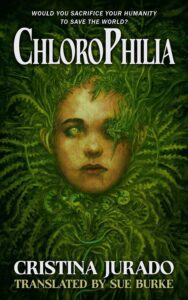
This review is based on an eARC (Advance Reading Copy) provided by the publisher via NetGalley in exchange for an honest review. ChloroPhilia will be released on January 14, 2025.
I had read a short story or two by Cristina Jurado a couple years ago, and while I was a bit wary that she can lean more toward horror than I prefer, the blurb of ChloroPhilia caught my attention, and I’ve been intentionally looking for more novellas outside the Tor ecosystem, so I thought I’d give Sue Burke’s 2025 translation a try.
ChloroPhilia takes place after dust storms raging across the face of the Earth send people scrambling underground, into bunkers and eventually constructed domes. The lead is the last human child born in his own domed civilization, and faced with a rash of miscarriages that threaten the very end of humanity, his doctor uses him as a test subject, splicing in plant genes in hopes of turning him into something that can survive in the new world.
If I had to pin down ChloroPhilia, I would probably call it a coming of age story of a human/plant hybrid in a post-apocalyptic world with no next generation on the horizon. But I expect a coming of age story to dig deep into the lead’s perspective, and ChloroPhilia really didn’t. In fact, the lead isn’t even introduced until a quarter of the way into the story, after a prologue from the perspective of the dust storm and a zeroth chapter following the doctor as he navigates a brutal underground world rife with violence and more than a little cannibalism. And when the story does settle into the lead’s perspective, it only provides a handful of scenes—keep in mind, this is a very short book—showing a little bit of school trouble and a long conversation about the old aboveground world before abruptly shifting to the climax.
It’s a structure that so thoroughly did not work for me that I wonder whether I’m just missing something. I have read and enjoyed Jurado’s stories and Burke’s translations before, so I can’t write off my struggles as simply the work of an amateur author or translator. It’s possible that some of my complaints are personal preference, as I tend to enjoy the tighter perspective common in contemporary speculative fiction than the zoomed out style that provides over-the-shoulder perspective on major events. It’s also possible that I’m missing some sort of essential cultural context. I’m not sure what that would be, but it is a translation from a language I barely understand from an unfamiliar country.
But whatever the reason, this one didn’t work for me on either the micro or macro levels. The distant perspective made the individual scenes feel like box-checking that had little emotional impact, to the point where I made it 80% into the book still feeling like I was reading the first couple chapters that give the basics of the world and characters before the story as a whole begins. But then the climax came so suddenly that the larger plot felt disjointed, with big reveals and a fairly graphic scene of sexual misconduct that felt like they should be shocking but instead mostly found me puzzled as to why the story had taken such an abrupt turn and whether I was supposed to be emotionally invested in the characters involved. The themes of exploring a hybridized, posthuman world are theoretically interesting, but neither the individual scenes nor the overarching plot brought them out in a way that I found compelling.
I’ve been putting scores on everything I read since I started blogging, but I’ve never really had to get a sense of the lower end of my range, because if I’m really not enjoying a book on any level, I usually DNF. This was a bit of a perfect storm, because I had enough confidence in the author to press on past an uninspiring opening, and by the time I became truly confident that I wasn’t going to grow into an appreciation of the story, the slim novella was already over.
So don’t worry too much about the specific score. This book didn’t work for me, but it clearly has worked for other readers. I won’t be recommending it, but if you enjoy stories that are willing to get fairly dark and don’t mind the over-the-shoulder perspective, there’s no harm in checking out a sample to see whether the style works better for you.
Can I use it for Bingo? It’s hard mode for Survival, and is also Indie Published, Multi-POV, has a Prologue or Epilogue, takes place in significant part Under the Surface, and features a Character with a Disability.
Overall rating: 7 of Tar Vol’s 20. One star on Goodreads.
